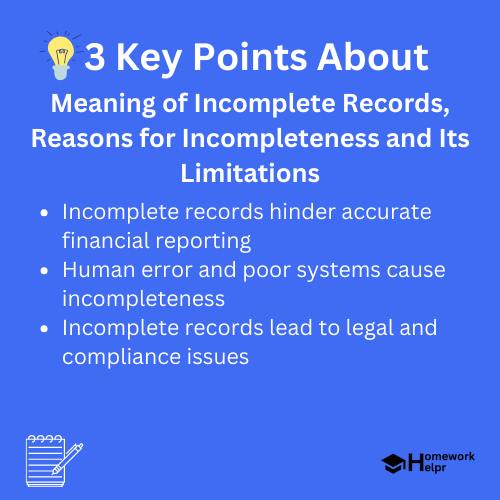📝 Summary
The term incomplete records refers to financial data that is missing or partially recorded, leading to challenges in maintaining accurate records. Incomplete records can occur due to poor filing systems, human error, lack of training, or a casual approach to business record-keeping. Such records can lead to significant limitations, including difficulties in financial analysis, tax compliance issues, loss of credibility, and potential legal consequences. To address these issues, businesses can implement a robust filing system, invest in technology, provide training, and conduct periodic audits. Effective record-keeping enhances organizational credibility and success.
Understanding Incomplete Records
The term incomplete records refers to financial or transactional data that is either missing, partially recorded, or otherwise not fully documented. This could happen due to various reasons, leading to challenges in maintaining accurate and reliable records. In this article, we will explore the meaning of incomplete records, the reasons behind their incompleteness, and the limitations they pose for businesses and individuals alike.
Meaning of Incomplete Records
Incomplete records occur when all necessary information regarding transactions is not available or has not been properly recorded in the accounting system. This situation often arises in manual bookkeeping or when businesses do not have a sophisticated system for tracking financial activities. The inability to access full transaction records can create significant difficulties during financial audits or when preparing tax returns.
In essence, incomplete records can lead to misstatements in the financial statements, generating erroneous conclusions about a company‚’ financial health. For instance, if a company does not record all sales transactions, it might undervalue its revenues and submit inaccurate financial reports. Such discrepancies can endanger the organization‚’ reputation and compliance with regulations.
Definition
Financial Audit: An examination of an organization‚’ financial statements and records to ensure accuracy and regulatory compliance.
Reasons for Incompleteness
Several factors can contribute to the incompleteness of records. Understanding these reasons can help in developing strategies to mitigate their impact. Here are some key reasons why records might be incomplete:
- Poor Filing Systems: A disorganized manner of filing documents can lead to missing records. If documents are not properly organized, tracking transactions becomes a daunting task.
- Human Error: Mistakes made during data entry or transaction recording often result in incomplete records. Simple typos, overlooked entries, and calculation errors can significantly affect the completeness of records.
- Lack of Training: Employees who are not adequately trained in financial record-keeping may fail to understand the importance of documenting every transaction accurately.
- Casual Business Approach: Small businesses that do not prioritize record-keeping, often thinking it‚’ unnecessary, may end up with incomplete records.
💡Did You Know?
Did you know that according to a study, around 30% of small businesses claim to have experienced problems stemming from incomplete records?
Limitations of Incomplete Records
Having incomplete records introduces several limitations that can affect financial management and overall business operations. Below are some critical limitations associated with incomplete records:
- Difficulty in Financial Analysis: Incomplete records make it challenging to conduct thorough financial analysis. Without complete data, companies cannot make informed decisions.
- Tax Compliance Issues: Incomplete records can lead to problems when filing taxes, as missing information may result in inaccurate tax returns.
- Loss of Credibility: Clients and stakeholders may lose trust in the business when financial records are not accurate or complete, potentially impacting future engagements.
- Legal Consequences: Incomplete records can put a company in violation of laws or regulations governing financial reporting, which may lead to legal actions.
Definition
Regulatory Compliance: Adhering to laws, regulations, guidelines, and specifications relevant to a business‚’ processes.
Addressing Incomplete Records
To mitigate the risks associated with incomplete records, businesses can adopt several best practices for effective record-keeping. Here are some strategies to ensure more complete records:
- Implement a Robust Filing System: Organizing documents and files systematically allows easier access and better tracking of transactions.
- Invest in Technology: Utilizing accounting software can significantly reduce human error and help maintain accurate records that are easy to retrieve.
- Training and Development: Regular training sessions for employees on the importance of complete record-keeping can help prevent errors and omissions.
- Periodic Audits: Conducting regular audits can help identify gaps in records and address them promptly.
Example
The utilization of accounting software like QuickBooks or Xero simplifies the record-keeping process and enhances accuracy. Additionally, businesses should conduct quarterly financial checks to identify any missing entries that need to be addressed.
Conclusion
In summary, incomplete records can pose significant challenges for successful financial management. Understanding the meaning of incomplete records, identifying the reasons behind their occurrence, and recognizing the limitations they impose can help individuals and businesses work towards better record-keeping practices. By adopting effective strategies and systems, the risks associated with incomplete records can be mitigated, promoting financial accuracy and ultimately enhancing an organization‚’ credibility and success.

Related Questions on Meaning of Incomplete Records, Reasons for Incompleteness and Its Limitations
What are incomplete records?
Answer: Incomplete records refer to financial data that is missing or partially recorded, making it difficult to maintain accurate and reliable records.
What causes records to be incomplete?
Answer: Key factors include poor filing systems, human error, lack of training, and a casual business approach to record-keeping.
What limitations arise from incomplete records?
Answer: Limitations include difficulty in financial analysis, tax compliance issues, loss of credibility, and potential legal consequences.
How can incomplete records be addressed?
Answer: Businesses can implement robust filing systems, invest in technology, provide training, and conduct periodic audits to enhance record-keeping practices.
